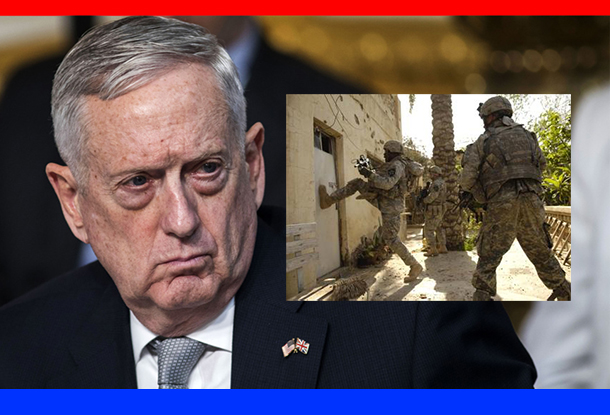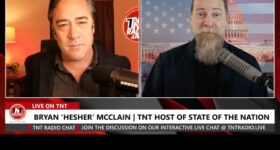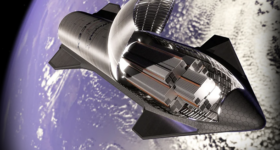
On Jan 19th, US Defense Secretary James ‘Mad Dog’ Mattis rolled out what appears to be a ‘blank cheque’ US defense strategy, complete with all the bold platitudes and promises of ‘greater security’ for America. But how in-tune with reality are defense ‘experts’? Is the NDS anything more than a Christmas ‘wish-list’ for US defense contractors?
According to many policy analysts, this latest National Defense Strategy (NDS) is bloated beyond any previous measure, to make matters worse – it has been rolled out on the same day that Congress is running its new bi-annual ritual of threatening a ‘government shutdown’ due to its spiraling budget deficit – not the best time to unveil a blueprint for a new corporate arms race.
According to Defense News:
Todd Harrison, a defense budget expert with the Center for Strategic and International Studies, warned that “a strategy that is set without regard for resource constraint is a strategy that risks being unexecutable” in practice.
“If it’s just a lot of words on a page and it doesn’t have numbers, saying ‘this is what it will cost and this is what we’re able to do’, and ‘this is how we will pay for it,’ it will leave a lot wanting,” he added.
As bad as the budgetary side is, from a geopolitical standpoint, it’s even more incoherent.
RT International reports…
US Secretary of Defense Jim Mattis has revealed a National Defense Strategy (NDS) shifting the focus from international terrorism to America’s old geopolitical rivals, Russia and China. But should these really be its priorities?
Mattis unveiled the new NDS document on Friday, calling for a bigger defense budget to counter any “threat to America’s democracy experiment” in the world. But in the view of Jennifer Breedon, a lawyer specializing in foreign policy, international law and religious terrorism, abandoning the war on terror to go back to Cold War rivalries is a mistake.
“This shows a lack of understanding of the foreign structure that many people in the US government have, including General Mattis, and of what’s going on and the threats to the world,” Breedon told RT. “He’s saying basically that the war on terrorism is no longer a great concern in the United States… Not only should it be a concern for the United States, but most of our allies and countries around the world.”

US soldier showing-off in Iraq by wearing satanic mask.
Rather than spending money on rebuilding government institutions and fighting genocidal terrorism in countries like Syria and Iraq, Breedon said that it looked like the US government was only interested in brighter, shinier bombs.
“This goes back to the Cold War,” she added. “It was always ‘who has the bigger thing?’ Spending lots of money on things that aren’t even threats yet just to show that hey, we have a bigger and more powerful military than you guys do. Because that’s all it is: our gun is bigger than yours.”
According to political commentator and journalist John Wight, the United States has been trying to reassert its position of power over the world in the wake of the Soviet Union’s collapse.
“I don’t think anyone in Moscow or Beijing will be surprised,” Wight said. “The actions on the ground dictate that America’s been engaged in this kind of ramping-up of its strategic projection of military power since Donald Trump was elected in 2016. And I think this should disabuse anyone of any notion that the Trump presidency would mark any kind of change in US foreign policy.”
Wight said that Washington was responding to the weapons capabilities of Russia and China, which have seen significant developments in the past few years. But this, he said, misses the point.
“Quantitative advantage in military terms does not necessarily translate into qualitative advantage, and we see this with the disastrous US military invasion of Iraq in 2003, where they were unable to pacify the country which everyone knows was part of their project for a new American century.
“The problem the Americans have is that they don’t get it. It’s not about being able to project military power; it’s about having public opinion on your side!”
READ MORE: New US defense strategy: Return to global dominance, slimming down Pentagon
Finally, the huge increases in budget demanded by the NDS worried political analyst Charles Ortel.
“As a taxpayer, a concerned citizen and a numbers person, I look at the number $562 billion in spending – and that’s the public number, we don’t know how much additional money may be off the books – that is an enormous amount of money for a nation as small as ours in terms of people. We’re a quarter the size of China,” Ortel told RT.
“Given all the cost overruns I’ve seen in the past, I am uncomfortable just throwing more money into a black box here and I’d like to see some real accountability on what we spend. I mean, that’s after more money than the gross domestic product of, I think, all but 20 countries of the 200 on the planet.”
In the great tradition of Washington secrecy, the real NDS report will not be available to the public, as Defense News confirms:
The NDS will come in both classified and unclassified versions. The classified version should give DoD “the chance to be extremely clear about what it prioritizes and, more importantly, what it doesn’t,” Schulman said. “The latter has always been difficult to say in public forums, but this strategy will be most meaningful if both DoD and Congress are clear on the balance of choices the department is making in their investment and focus.”
Hicks also expects more details about funding in the classified portion of the document, but warned that hard numbers likely won’t be found there, but instead come out of further discussions on the Hill.
READ MORE PENTAGON NEWS AT: 21st Century Wire Pentagon Files
SUPPORT 21WIRE – SUBSCRIBE & BECOME A MEMBER @ 21WIRE.TV













